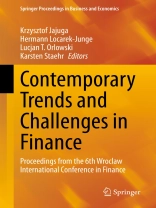This volume continues to highlight the latest research contributions presented at the annual Wroclaw conference in Finance (Poland), covering a wide range of topics in the field. The chapters reflect the extent, diversity, and richness of research areas, and discuss both fundamental and applied finance. A detailed analysis of current financial-market problems including specifics of Polish and Central European markets is also part of this volume. Selected chapters also examine the results of advanced financial modeling. These proceedings are a valuable resource for researchers in universities and research and policy institutions, graduate students and practitioners in economics, finance and international economics in both private and government institutions.
Jadual kandungan
Chapter 1. The relationship between ethnic diversity and stock market development: A global perspective.- Chapter 2. Does Withholding Tax Reduce International Income-Shifting by FDI?.- Chapter 3. The relationship between trading volume and returns volatility on Warsaw Stock Exchange.- Chapter 4. Factors influencing individual investor participation in stock market.- Chapter 5. Model Risk of Va R and ES using Monte Carlo: Study on Financial Institutions from Paris and Frankfurt Stock Exchanges.- Chapter 6. Tick Size Reduction and Liquidity Dimensions – Evidence from an Emerging Market.- Chapter 7. Cryptocurrency portfolio construction using machine learning models.- Chapter 8. Development factors of blockchain technology within banking sector.- Chapter 9. Does competition matter for the effects of macroprudential policy on bank asset growth?.- Chapter 10. Systemic risk in selected countries of Western and Central Europe.- Chapter 11. Industry and Size Effect in the Relation between Corporate Material and Financial Decisions: Findings from the EU Countries.- Chapter 12. Technology level and financial constraints of public listed companies.- Chapter 13. Differences in use of credit products between the old and new member states of the European Union.- Chapter 14. Diversified risky financial assets in portfolios of risk-averse households – what determines their occurrence?.- Chapter 15. Financial Behavior: Preliminary Survey Results.
Mengenai Pengarang
Krzysztof Jajuga is a Professor of Finance. He holds the chair of the Department of Financial Investments and Risk Management at Wroclaw University of Economics and Business. He obtained his doctoral degree in Economics from Wroclaw University of Economics and Business in 1982 and became a full professor in 1992. His field of scientific interest is financial econometrics, capital markets and risk analysis and management. He is the author of numerous international and national publications, including 18 books. He holds a number of positions including president of CFA Society Poland.
Hermann Locarek-Junge has been a Professor of Finance and Financial Services at TU Dresden’s Faculty of Management and Economics since 1995. He has been visiting professor and research fellow at a number of international institutions and universities. During his academic career, he undertook research work for several banks, including the Deutsche Bank, Dresdner Bank, Sparkasse Dresden, Union Investment, and the German National Research Foundation (DFG).
Lucjan T. Orlowski is a Professor of Economics and Finance and a Director of the Doctor of Business Administration in Finance Program at Sacred Heart University, USA. His research interests include monetary economics, financial markets and institutions, and financial stability. He has authored numerous books, chapters in edited volumes and articles in scholarly journals. He has been visiting professor and research fellow at many prominent international institutions and universities and served in an advisory role for many governments and financial institutions including Polish Ministry of Finance and National Bank of Poland. He has worked with the European Commission Economic and Finance Committee on the post-crisis policy responses to extreme risks in financial markets. He is collaborating with Chicago Mercantile Exchange Group on analyzing the volatility of financial futures and its impact on real economy. He is a Doctor Honoris Causa recipient from Wrocław University of Economics.
Karsten Staehr has since 2007 worked as a Professor of economics at Tallinn University of Technology, Estonia. He also holds a part-time position as a research supervisor at Eesti Pank, the central bank of Estonia. He holds a master’s degree from the Massachusetts Institute of Technology and master’s and Ph.D. degrees from the University of Copenhagen. He undertakes research and policy analysis within macroeconomics, international finance, public economics and transition economics. He is an associate editor of the Baltic Journal of Economics and on the editorial board of several other journals.












